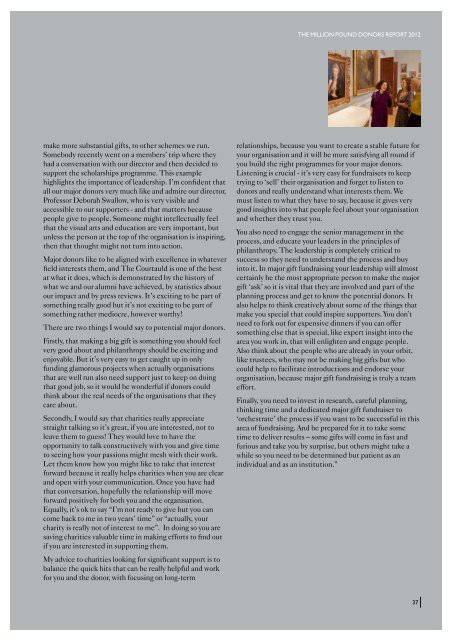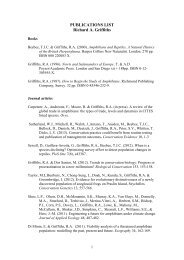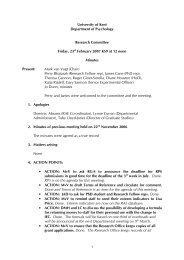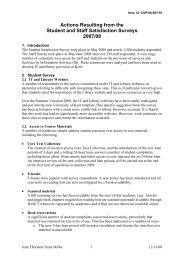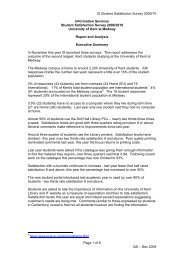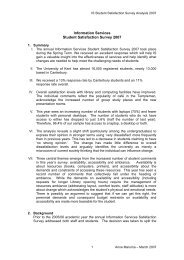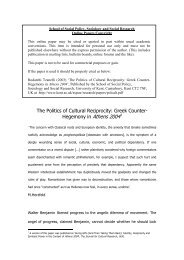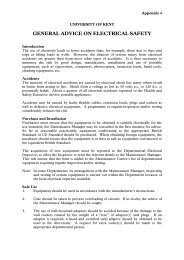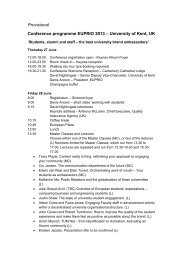The Million Pound Donors Report 2012 - University of Kent
The Million Pound Donors Report 2012 - University of Kent
The Million Pound Donors Report 2012 - University of Kent
Create successful ePaper yourself
Turn your PDF publications into a flip-book with our unique Google optimized e-Paper software.
make more substantial gifts, to other schemes we run.<br />
Somebody recently went on a members’ trip where they<br />
had a conversation with our director and then decided to<br />
support the scholarships programme. This example<br />
highlights the importance <strong>of</strong> leadership. I’m confident that<br />
all our major donors very much like and admire our director,<br />
Pr<strong>of</strong>essor Deborah Swallow, who is very visible and<br />
accessible to our supporters - and that matters because<br />
people give to people. Someone might intellectually feel<br />
that the visual arts and education are very important, but<br />
unless the person at the top <strong>of</strong> the organisation is inspiring,<br />
then that thought might not turn into action.<br />
Major donors like to be aligned with excellence in whatever<br />
field interests them, and <strong>The</strong> Courtauld is one <strong>of</strong> the best<br />
at what it does, which is demonstrated by the history <strong>of</strong><br />
what we and our alumni have achieved, by statistics about<br />
our impact and by press reviews. It’s exciting to be part <strong>of</strong><br />
something really good but it’s not exciting to be part <strong>of</strong><br />
something rather mediocre, however worthy!<br />
<strong>The</strong>re are two things I would say to potential major donors.<br />
Firstly, that making a big gift is something you should feel<br />
very good about and philanthropy should be exciting and<br />
enjoyable. But it’s very easy to get caught up in only<br />
funding glamorous projects when actually organisations<br />
that are well run also need support just to keep on doing<br />
that good job, so it would be wonderful if donors could<br />
think about the real needs <strong>of</strong> the organisations that they<br />
care about.<br />
Secondly, I would say that charities really appreciate<br />
straight talking so it’s great, if you are interested, not to<br />
leave them to guess! <strong>The</strong>y would love to have the<br />
opportunity to talk constructively with you and give time<br />
to seeing how your passions might mesh with their work.<br />
Let them know how you might like to take that interest<br />
forward because it really helps charities when you are clear<br />
and open with your communication. Once you have had<br />
that conversation, hopefully the relationship will move<br />
forward positively for both you and the organisation.<br />
Equally, it’s ok to say “I’m not ready to give but you can<br />
come back to me in two years’ time” or “actually, your<br />
charity is really not <strong>of</strong> interest to me”. In doing so you are<br />
saving charities valuable time in making efforts to find out<br />
if you are interested in supporting them.<br />
My advice to charities looking for significant support is to<br />
balance the quick hits that can be really helpful and work<br />
for you and the donor, with focusing on long-term<br />
the MIllIon PoUnd donors rePort <strong>2012</strong><br />
relationships, because you want to create a stable future for<br />
your organisation and it will be more satisfying all round if<br />
you build the right programmes for your major donors.<br />
Listening is crucial - it’s very easy for fundraisers to keep<br />
trying to ‘sell’ their organisation and forget to listen to<br />
donors and really understand what interests them. We<br />
must listen to what they have to say, because it gives very<br />
good insights into what people feel about your organisation<br />
and whether they trust you.<br />
you also need to engage the senior management in the<br />
process, and educate your leaders in the principles <strong>of</strong><br />
philanthropy. <strong>The</strong> leadership is completely critical to<br />
success so they need to understand the process and buy<br />
into it. In major gift fundraising your leadership will almost<br />
certainly be the most appropriate person to make the major<br />
gift ‘ask’ so it is vital that they are involved and part <strong>of</strong> the<br />
planning process and get to know the potential donors. It<br />
also helps to think creatively about some <strong>of</strong> the things that<br />
make you special that could inspire supporters. you don’t<br />
need to fork out for expensive dinners if you can <strong>of</strong>fer<br />
something else that is special, like expert insight into the<br />
area you work in, that will enlighten and engage people.<br />
Also think about the people who are already in your orbit,<br />
like trustees, who may not be making big gifts but who<br />
could help to facilitate introductions and endorse your<br />
organisation, because major gift fundraising is truly a team<br />
effort.<br />
Finally, you need to invest in research, careful planning,<br />
thinking time and a dedicated major gift fundraiser to<br />
‘orchestrate’ the process if you want to be successful in this<br />
area <strong>of</strong> fundraising. And be prepared for it to take some<br />
time to deliver results – some gifts will come in fast and<br />
furious and take you by surprise, but others might take a<br />
while so you need to be determined but patient as an<br />
individual and as an institution.”<br />
37


